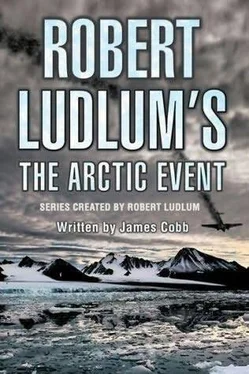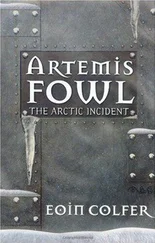It reminded Smith of long-past summers in Yellowstone, and the childhood pride and thrill of packing into the backcountry for the first time with his father and Uncle Ian.
The air especially, chill, sweet, and biting with life. He took a last deep breath of it, relishing the experience, and stepped backward off the edge of the precipice.
His horizon rotated a smooth ninety degrees, and the climbing harness gave him a reassuring hug as the thick green nylon rope laced through his carabiners took up the strain. With his weight held by the rappelling brake and the cleated soles of his Danner “Fort Lewis” mountain boots braced against the lichen-mottled black basalt, he stood on the vertical face of the cliff. He was still new enough to the experience that he grinned with exhilaration. By God, this was better than lab work!
“Okay, Colonel,” the loud-hailer-amplified voice of the instructor echoed up from the base of the cliff, “push off and take it easy.”
Above, Smith’s fellow students, clad in the same forest camouflage that he wore, peered over the cliff edge. This was the big drop, the 150-foot rappelling descent. The slack of the rope trailed away below him, and Smith gave it a final clearing flick. Then he snapped his legs straight, shoving away from the rock and allowing the line to feed through the brake.
In Smith’s continuing efforts to balance the wildly diverse aspects of his life, that of soldier, scientist, physician, and spy, this mountain warfare course had been a resounding success.
Over the last three weeks, he had thrown himself into the challenge of the program with a growing enthusiasm, hardening his body with the muscle-cracking wilderness training regime and clearing his thinking after too many days spent buried in the Fort Detrick laboratories of the U.S. Army’s Medical Research Institute of Infectious Diseases.
He had revived atrophied combat skills and had learned new ones: rough-terrain orienteering, hostile-climate survival, camouflage, high-angle marksmanship. And he had been introduced to the art of mountaineering. Smith had learned how to use crampons, pitons, and a rock hammer and more critically, how to trust in the rope and the harness, placing in abeyance the instinctive human fears of the fall and the high place.
The rappelling line zipped through the steel loops, the palm of Smith’s heavy glove warmed, and his boots jolted against the rock twenty feet farther down the face. He felt his eyes narrow and his face tighten as the adrenaline surge hit, and once more he pushed away and sheered off another forty feet of cliff.
“Easy, sir,” the voice from below warned.
For a third time he pushed off, hard, allowing himself to plummet, the rope screaming and the rappelling brake smoking.
“Easy, Colonel…Easy…Easy!…I SAID EASY, GODDAMN IT!”
Smith braked hard, arresting his fall. Pulling himself upright, he dropped boots-first the last few feet to the fir-needle duff at the cliff base. Backing off the bottom end of the rope, he rubbed the scalding heat pulse out of his glove and onto the thigh of his fatigues.
A stocky ranger sergeant in a sand-colored beret came up behind him. “Begging the colonel’s pardon, sir,” he said sourly, “but I hope you realize that an officer can bust his ass up here just about as bad as an enlisted man or an NCO.”
“I’ll take your word for it, Top,” Smith grinned.
“Then when I say ‘EASY, SIR,’ I damn well mean it!” The climbing instructor was a twenty-year veteran of both the Seventy-fifth Ranger Regiment and the famed Tenth Mountain Division and thus was a rather privileged individual, even to a light colonel.
Smith sobered and undid the chin strap of his helmet. “I hear you, Sergeant. I got a little full of myself up there. Bad idea. Next time it’ll be by the book.”
Mollified, the instructor nodded back. “Okay, sir. Beyond being a little wild, that was a good descent.”
“Thanks, Top.”
The instructor went back to overseeing the next student down, and Smith withdrew to the edge of the clearing at the cliff base. Shedding his helmet and harness, he removed a floppy boonie hat from his cargo pocket, slapping it into shape before settling it over his dark, short-trimmed hair.
Jon Smith was a man doing his early forties well: broad-shouldered, narrow-waisted, and taut-muscled from both his recent bout of training and an instinctively vigorous lifestyle. He was handsome in a strong, man’s way, his tanned features fine-planed, intent, and somewhat immobile-a face that kept secrets well. His eyes, an unusual shade of dark blue, had the capacity to cut across a room with a penetrating focus.
Taking another deep pull of the clean mountain air, Smith sank down at the base of a towering Douglas fir. This was a world he had lived in once. During an earlier phase of his career, before going into research and USAMRIID, he had done a tour with U.S. Army Special Forces as a combat medical officer on forward deployment with the Teams. It had been a good time, a time of challenges and comradeships. It had been a time of fears and despairs as well, but all in all, a good time.
A random thought had been creeping into his consciousness over the past few days: What about going tactical again, maybe for another tour in Special Forces? What about going back to the real Army for a while?
Smith recognized it to be only a random fancy. He was too senior for the field anymore. The best he could manage would be a desk job, a staff posting, probably right back inside the Washington beltway.
And then, he must confess, he was good at his current researcher’s position, and it was a critical one. USAMRIID was America’s first line of defense against both bioterrorism and the evolving global disease pool, and Smith was at the cutting edge of that defense. Important duty, undeniably.
And finally, there was his other tasking, the one not listed in his open service record. The one that had been born out of a megalomaniac’s nightmare called the Hades Project, and the death of Dr. Sophia Russell, the woman he had loved and had planned to marry. That was a duty not to be denied, either, not if he was to know peace with himself.
Smith leaned back and relaxed against the moss-sheathed trunk of the fir tree, looking on as his classmates took their turn at the long line. Still, today was a good day to be a soldier.
The Camp David Presidential Retreat
The Camp David Presidential Retreat was located some seventy miles outside of Washington, DC, in a carefully isolated section of the Catoctin Mountain Recreation Area.
Its origins extended back to the turbulence of the Second World War, when, concerned about the safety of the presidential yacht, Potomac, the Secret Service requested that Franklin Delano Roosevelt find a new, more securable vacation and rest site in the Washington area.
Such a site was located in Maryland’s forested hill country, a summer camp for federal employees built in the mid-1930s by the Civilian Conservation Corps as a pilot reclamation project for marginal wasteland.
As a holdover from the days of the Potomac, the camp was staffed by the United States Navy and Marine Corps, a tradition that continued to the present day, and it was originally code-named “USS Shangri-La. ” The retreat did not gain the name “Camp David” until the 1950s, when it was retitled in honor President Eisenhower’s grandson.
Many critical pieces of diplomacy and statesmanship had taken place at the retreat, such as the historic Camp David peace accords between Egypt and Israel. But for all the meetings or conferences reported by the national media, there were others unreported and shrouded in the deepest secrecy.
Читать дальше












